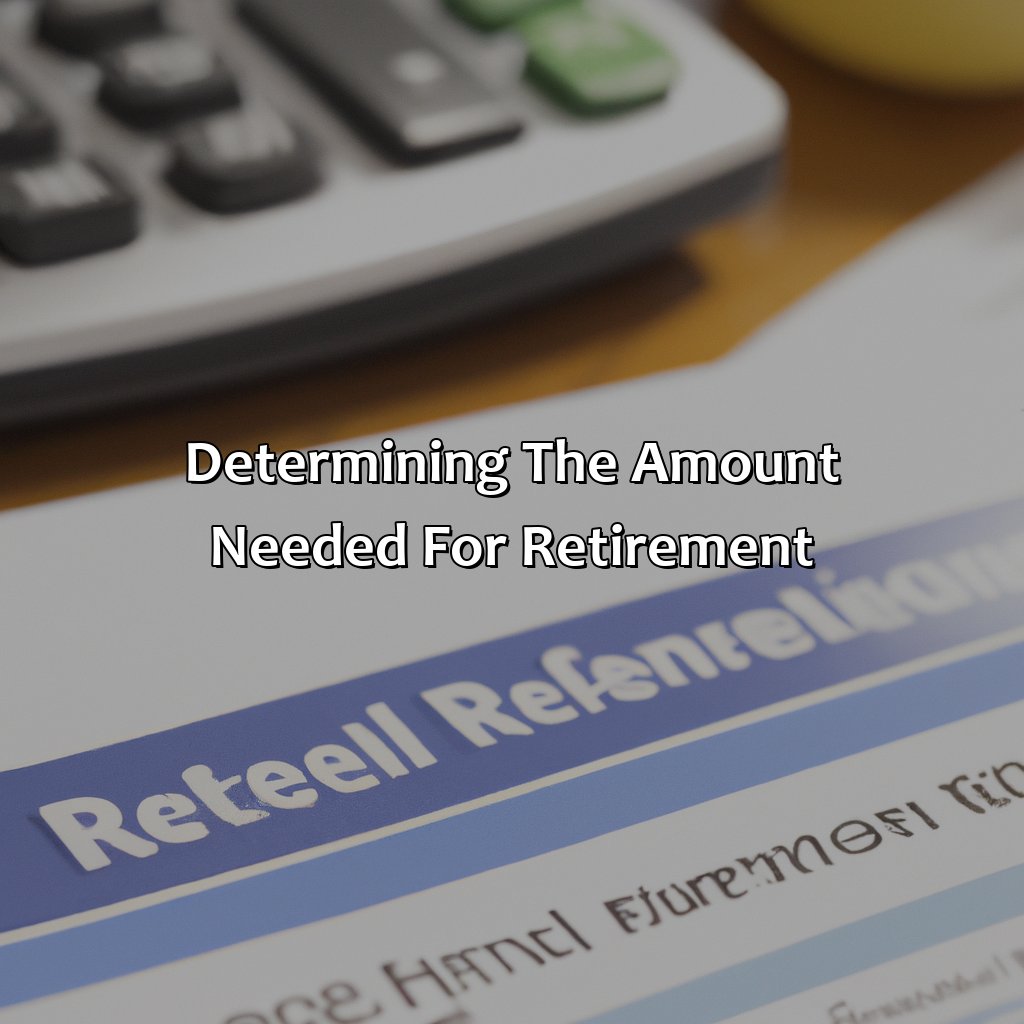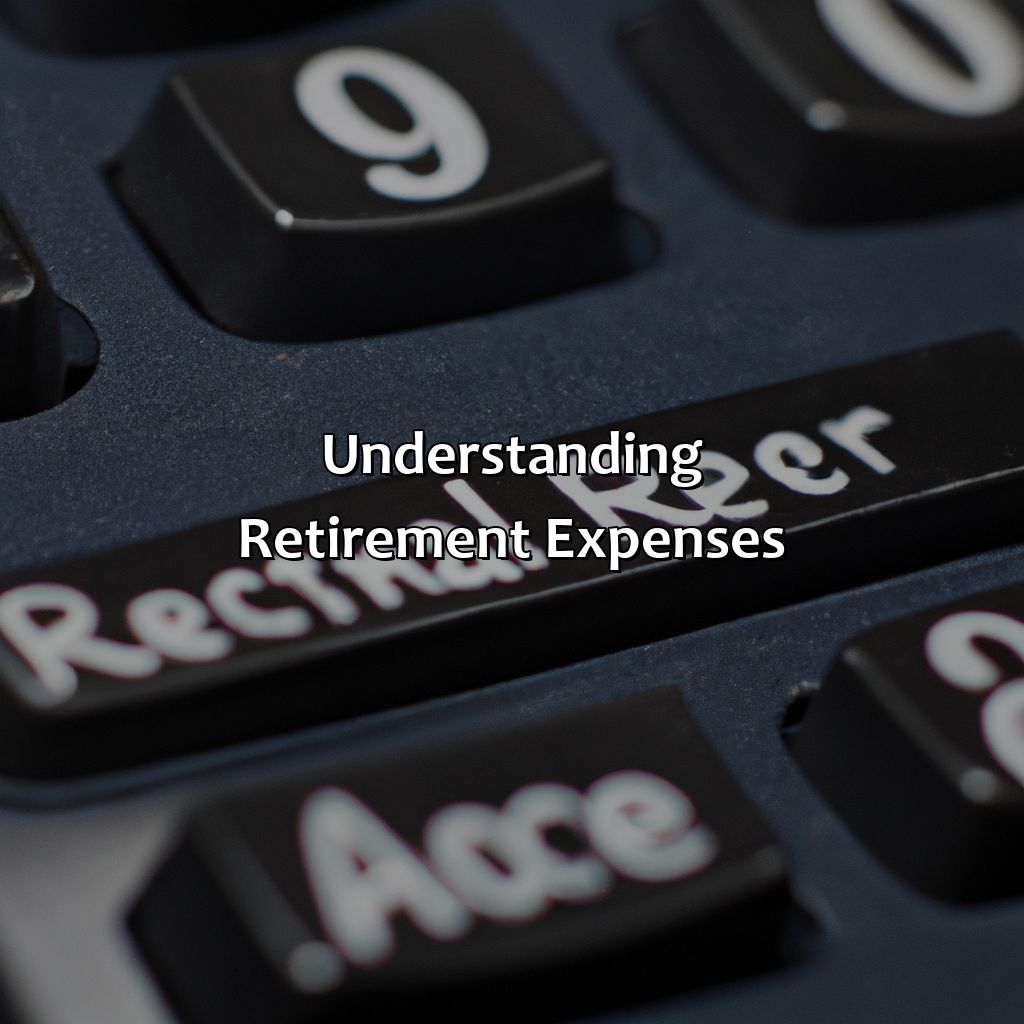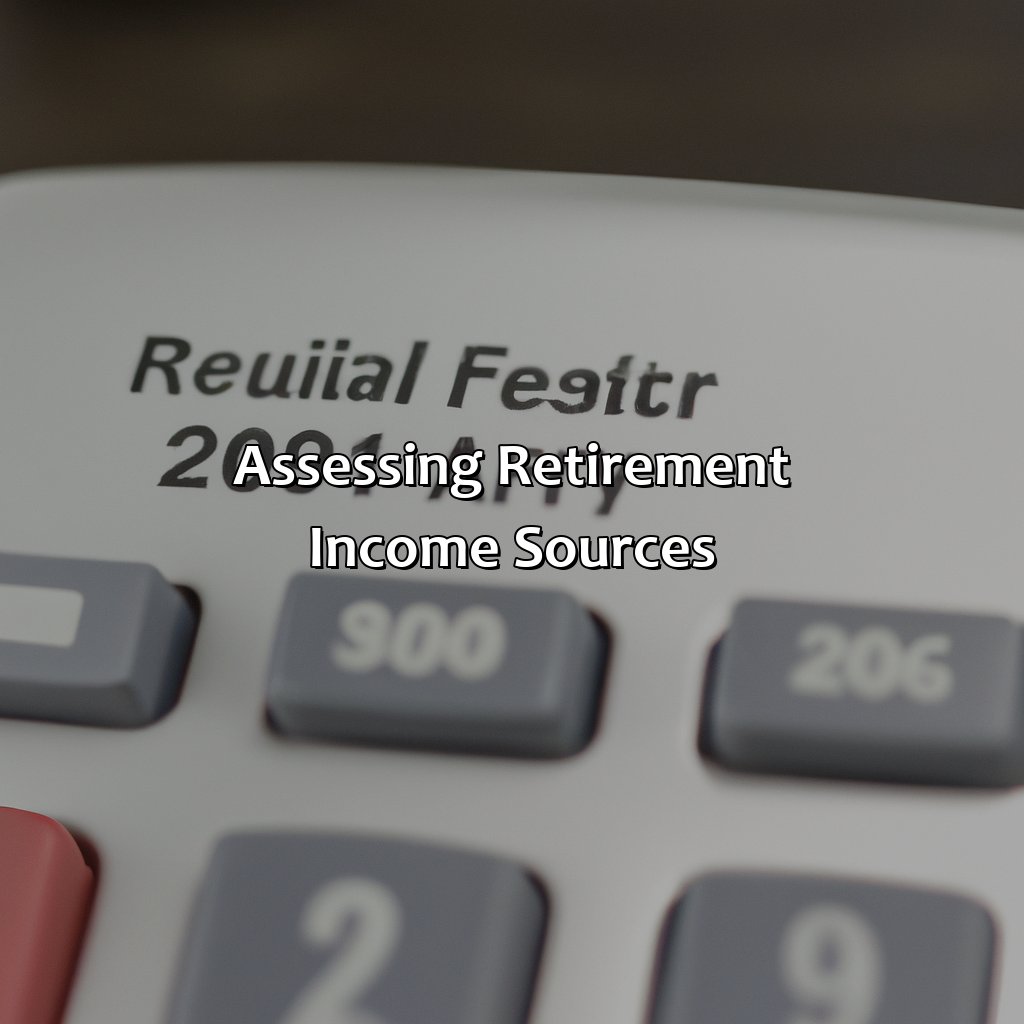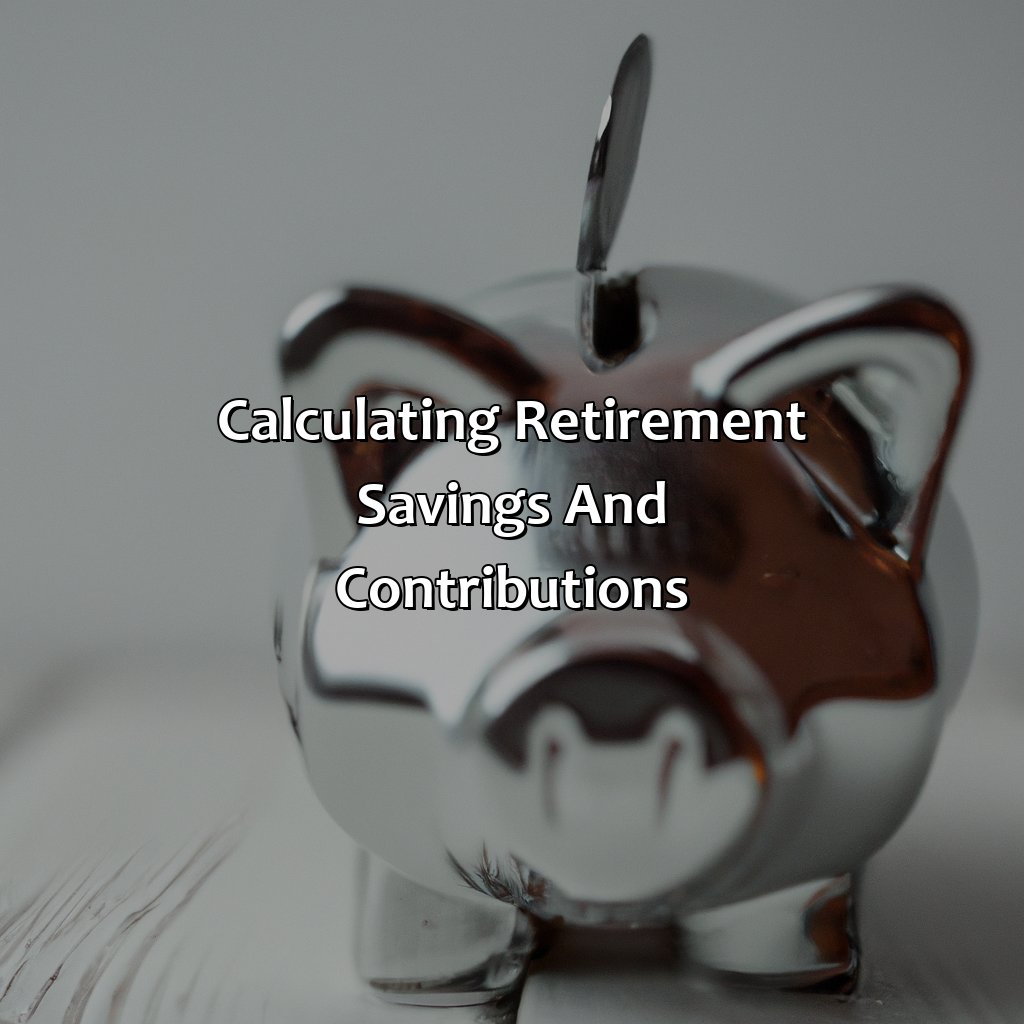How Much Do You Need For A Comfortable Retirement?
Key Takeaway:
- Determining the amount needed for retirement involves understanding your expected expenses and income sources, and calculating your future savings goals and strategies.
- Retirement expenses can include housing and utility expenses, healthcare expenses, transportation expenses, and leisure and travel expenses. It is important to plan for these expenses ahead of time to ensure a comfortable retirement.
- Assessing retirement income sources can involve considering Social Security benefits, employer-sponsored retirement plans, and personal savings and investments. By understanding these income sources, you can better plan for your retirement.
Are you looking for strategies to finance a comfortable retirement? You can save money and maintain your lifestyle after retirement. In this article, we’ll discuss the amount of money you need to save for a stress-free retirement.
Determining the Amount Needed for Retirement
Determining Retirement Fund Necessities
Accurately calculating the money required for a comfortable retirement is critical. It is essential to consider factors like standard of living, medical expenses, and inflation rate when determining retirement funds. One approach is to use the 4% rule, which recommends withdrawing 4% of retirement savings yearly. Nevertheless, other factors that need consideration are current debts and potential unexpected expenses.
Additionally, ensuring that a retirement fund is large enough to meet one’s desired financial goals and eventualities is crucial. It’s best to start early and evaluate the contributions and growth rate regularly. The earlier one starts, the smaller the portions of their income they have to contribute to their retirement account. Also, the longer the money is invested, the bigger it becomes.
It’s critical to keep in mind that every person’s retirement plans differ, and the amount required will not be the same. Therefore, employing a retirement planner calculator or consulting a professional financial advisor is advisable.
One of the most iconic retirement success stories is about Ronald Read, a Vermont-born janitor and gas station attendant, whose net worth was $8 million at the time of his passing. Throughout his life, Read bought shares in well-established American companies and held on to them, steadily accumulating a fortune. However, it’s essential to do one’s own research and diversify investments to mitigate the risks and ensure a comfortable retirement.

Image credits: retiregenz.com by Joel Washington
Understanding Retirement Expenses
For successful retirement preparation, it is essential to comprehend the expenses you will face. This article, “Understanding Retirement Expenses,” with its subsections – housing/utility, healthcare, transportation, leisure and travel expenses – gives insight into the areas demanding financial planning.

Image credits: retiregenz.com by James Jones
Housing and Utility Expenses
Maintaining a Comfortable Living Environment and Energy Bills in Retirement
Housing and utility expenses are the biggest expenditure for retirees. Finding an affordable place to live, whether renting or owning, can require significant research and negotiation. Another vital consideration is reducing energy costs without sacrificing comfort.
One of the unique considerations for retirees is home modifications to accommodate decreased mobility, which can add significantly to accommodation costs. To mitigate this cost, downsizing to a smaller property may be necessary.
Considering installing energy-efficient appliances, insulation, double-glazed windows and solar panels can also help reduce monthly bills. Insulating your home appropriately can avoid losing valuable heat during cold weather conditions while also being beneficial during summer months by preventing an excess buildup of heat within your home.
In summary, finding budget-friendly accommodation while ensuring suitable living amenities is essential for seniors. Making energy-saving upgrades to homes will lead to more comfortable living arrangements with lower monthly bills in retirement.
Retirement may give you plenty of time for golf, but it also means you’ll be spending more on knee replacements than clubs.
Healthcare Expenses
As we age, the cost of healthcare can become a significant financial burden. Medical bills and prescription costs can add up quickly, impacting our retirement savings. In order to plan for this expense, it’s important to consider healthcare expenses as a key factor in retirement planning.
One way to prepare for healthcare expenses is to consider purchasing long-term care insurance. This type of insurance policy can help cover the cost of nursing home care or in-home health aides.
Another consideration is setting aside funds in a health savings account (HSA), which allows pre-tax dollars to be saved for medical expenses. It’s important to note that HSAs are only available for individuals enrolled in high-deductible health plans.
Lastly, staying healthy through preventative measures such as exercise and a balanced diet may help reduce future medical costs. By taking steps to protect our health and understanding the potential impact of healthcare expenses on our retirement savings, we can better plan and budget for our golden years.
Retirement is like a road trip, except you don’t have to worry about rushing to your next destination…unless your golf tee time is at 8 AM.
Transportation Expenses
When planning for retirement, it is important to consider the expenses related to mobility and travel. This can include costs associated with owning and maintaining a vehicle or using public transportation.
Transportation expenses are essential for retirees who wish to remain active and engaged in their community. These costs can vary depending on location, lifestyle, and individual preferences. It is crucial to account for these expenses when creating a retirement budget to ensure they do not cause financial strain.
One unique aspect of transportation expenses is the potential for unexpected repairs or replacements. As vehicles age, they may require more frequent maintenance or even replacement, which can be costly. Thus, it’s necessary to factor in an emergency fund that accounts for these potential expenses.
Don’t underestimate the importance of mobility in your retirement years. Create a comprehensive plan that includes transportation as one of your main concerns. Not doing so could lead to missed opportunities or even isolation due to an inability to travel freely.
Retirement may be relaxing, but don’t chill too hard or you’ll need to dip into your ‘Funeral Expenses’ fund a little earlier than planned.
Leisure and Travel Expenses
For those planning their golden years, travel and recreational expenses are a crucial component. These costs involve both domestic and international travel, including accommodation prices and entertainment expenses. Travel provides the opportunity for retirees to indulge in leisure activities like sightseeing, attending concerts, or eating at fine restaurants.
When planning your retirement budget, you’ll need to consider the frequency and duration of your travels. Costs vary based on many factors such as seasonality, destination popularity, and accommodation quality. Certain destinations may require extra fees like vaccinations or visas.
To ensure that you have enough funds allocated for these costs, consider researching package deals or loyalty programs that could offer discounts. It may also be wise to plan a contingency fund for unforeseen circumstances such as medical emergencies when traveling.
Retirement is the time to explore beyond your usual boundaries and experience new cultures. European holidays can provide unique perspectives while African safaris can leave retirees spellbound by exotic wildlife. Whatever your preference may be – a long cruise, a ski holiday or beach vacation – it’s important to have adequate funds set aside for travel and recreation expenses.
A retired couple I spoke with planned extensively for their post-work adventures but encountered unexpected flight delays during their trip which significantly affected their budget. They had wished they had kept back-up funds earmarked for these unfortunate circumstances.
Retirement income sources: because you can’t rely on winning the lottery or finding a pot of gold at the end of the rainbow.
Assessing Retirement Income Sources
To get the retirement income you need for a comfy retirement, you can look into Social Security Benefits, Employer-sponsored Retirement Plans, and Personal Savings and Investments. These three sections can help you figure out how much money you can get from each source. You’ll be able to maximize each one, so you can enjoy a financially secure retirement.

Image credits: retiregenz.com by Joel Woodhock
Social Security Benefits
The government’s Retirement Income Program is a critical aspect of post-working life. This program provides citizens with an additional source of revenue and secures their financial stability. Social security payments serve as reliable payouts, covering medical bills, housing costs, and other living expenditures.
It is desirable to maximize social security payment amounts for maximizing benefits when required. For instance, if you are financially stable before retirement and choose not to withdraw your claim until the 70 years limit, it would result in significant increases to your payments.
Aside from maximizing social security payouts early on, those looking to retire should also consider the long-term implications of volatile inflation rates on purchasing power.
While social security has been a popular retirement income source for many years since its first implementation in the 1930s in America, it has also gone through several adjustments over the decades to cater better for people intending to retire each year. Adjustments include fluctuations in contribution limits from employers and individuals and changes concerning how full retirement age impacts payout amounts.
Knowing about these adjustments can help retirees prepare their finances responsibly by taking advantage of favorable conditions or devising alternate plans when needed.
Your boss may not care about your happiness, but they do care about their tax break – so make sure to take advantage of that 401(k) match.
Employer-sponsored Retirement Plans
Retirement assets offered by employers are a crucial factor to consider for your retirement plan. These plans provide tax benefits and frequently come with matching contributions from the employer. Employer-sponsored Retirement Plans include 401(k), 403(b), and pension plans. As these plans have investment options, it is recommended to opt for diversified investment portfolios to mitigate risks.
It is mandatory to understand any fees applicable, vesting periods, withdrawal rules and tax advantages. This plan’s vital feature is that one can make periodic contributions directly from their salary, which is convenient and stress-free.
It is suggested that those who participate in employer-sponsored retirement plans should take full advantage of an employer’s matching contribution capacity, if available. Keep track of contributions, loan repayment schedules, and changes in employment status.
Pro Tip: If permitted by your employer, do invest beyond the contribution limit hence maximizing savings for the future.
Who needs a social life when you can have a healthy retirement savings account?
Personal Savings and Investments
One of the sources of retirement income that needs to be considered is one’s personal financial assets. This includes savings and investments made by an individual over the years. The amount needed may differ based on various factors such as lifestyle, health care expenses, and inflation.
Having sufficient personal savings and investments is crucial for a comfortable retirement. These assets can provide a steady stream of income even when other sources such as pension plans or social security may not be enough. It is essential to balance risks and diversify investments to mitigate losses due to market fluctuations.
In addition to traditional investment options, newer alternatives such as digital currencies or peer-to-peer lending platforms could also be explored. However, careful research and consultation with financial experts are recommended before investing in them.
To ensure adequate retirement income from personal savings and investments, individuals must budget effectively and focus on long-term planning goals. Allocating funds towards saving early in life can yield significant returns over time due to compounding.
Ultimately, having multiple reliable sources of retirement income is vital for a comfortable retirement experience. Taking full advantage of personal savings and investment opportunities ensures financial stability throughout one’s golden years.
Figuring out retirement savings is like trying to solve a Rubik’s cube: frustrating, time-consuming, and rarely accomplished without a cheat sheet.
Calculating Retirement Savings and Contributions
Calculate your retirement savings and contributions? Head to the section called “Calculating Retirement Savings and Contributions”.
Curious how much you need for a cozy retirement? Check out the sub-sections on Retirement Savings Goals and Retirement Savings Strategies.
Unlock the best strategies to reach your retirement goals!

Image credits: retiregenz.com by Adam Duncun
Retirement Savings Goals
Retirement Planning Objectives:
Planning for retirement can be challenging, but it is essential to achieve financial security in your golden years. You will need to set appropriate retirement savings goals that suit your lifestyle and income.
- Determine Your Retirement Lifestyle: Decide how you want to live once you retire. Determine your future expenses and plan accordingly.
- Calculate Income Replacement Ratio: Create a budget based on post-retirement expenses and calculate the amount required for a comfortable life.
- Estimate Annual Retirement Savings: Use a savings calculator and estimate how much you’ll require for retirement. Set achievable goals.
- Monitor Your Progress: Check your progress regularly with an online retirement planner or financial advisor.
Influential Factors:
The retirement savings amount varies depending on various factors such as where you live, health care costs, inflation, market volatility, Social Security benefits, etc.
Effective Suggestions:
- Estimate how much you may need in retirement by tracking your spending now.
- Save early so that compound interest works its magic.
- Contribute at least enough to get employer contributions if offered.
- Maximize contributions to tax-advantaged accounts like IRAs and 401(k)s while ensuring diversification of investments.
- Having realistic expectations may help avoid surprises down the road.
Get ready to save like you’re a broke college student again because retirement is just like tuition fees – it never gets cheaper.
Retirement Savings Strategies
Retirement planning requires a strategic approach to ensure your savings and contributions can support your desired lifestyle after retirement. One approach could be calculating the necessary amount required for a comfortable retirement, taking into consideration unexpected expenses and inflation. A fixed percentage of income-saving strategy could also be adopted, which involves saving a set percentage of your earnings.
Employing these tactics would allow individuals to have a comfortable retirement and secure their financial future.
Consulting with Financial Advisors for Retirement Planning
Consulting with Expert Financial Strategists for Planning Retirement
When it comes to planning for retirement, consulting with expert financial strategists is a crucial step to ensure a comfortable life after retiring. Experienced financial advisors can assist in developing a comprehensive retirement plan that aligns with your future goals and objectives. They can provide you with tailored retirement solutions, help you manage your retirement portfolio, and provide advice on maximizing your savings to secure a comfortable future.
Moreover, these financial advisors can offer sound advice on investment risks and develop a suitable investment strategy that matches your individual risk tolerance. They can also help you estimate your retirement needs and create investment plans that will help you achieve your retirement goals.
Anecdote: One of the biggest mistakes people make when planning for retirement is underestimating their retirement costs. A retired couple was saving $100,000 annually, thinking it was enough for a comfortable retirement. However, they ended up spending double the amount in the first year alone. Consulting with financial advisors earlier could have helped them better manage their retirement savings and plan accordingly.
In summary, seeking professional financial advice in planning for retirement can make a significant difference in ensuring a comfortable retirement life. With the right guidance, advice, and tailored investment plans, you can be confident that you are investing wisely to secure a prosperous future.

Image credits: retiregenz.com by Yuval Washington
5 Facts About How Much You Need for a Comfortable Retirement:
- ✅ The amount needed for a comfortable retirement varies depending on factors such as lifestyle, health, and location. (Source: CNBC)
- ✅ Many financial advisors suggest having saved at least 10-12 times your pre-retirement income by the time you retire. (Source: NerdWallet)
- ✅ Social Security is only designed to replace around 40% of your pre-retirement income. (Source: AARP)
- ✅ Healthcare costs in retirement can be a significant expense, with estimates suggesting an average of $295,000 for a couple retiring at age 65. (Source: Fidelity)
- ✅ Retirement planning should begin early, with experts recommending starting as soon as possible and regularly revisiting your plan as circumstances change. (Source: Investopedia)
FAQs about How Much Do You Need For A Comfortable Retirement?
How much do you need for a comfortable retirement?
It depends on various factors, such as your lifestyle, your current age, health, and your plans. Most experts suggest having a retirement corpus equivalent to 10-12 times your current annual income, but it could also depend on the standard of living you desire post-retirement.
How can I calculate the amount I need for a comfortable retirement?
You can use online retirement calculators to get an estimate of the required corpus. You would need to input your current age, annual income, expected retirement age, inflation rate, and estimated expenses post-retirement.
What are the key factors that determine how much I need for a comfortable retirement?
Several factors come into play while evaluating the ideal corpus required for a comfortable retirement. These include your current age, income, lifestyle, expenses, dependents, health, and retirement goals.
What are the consequences of not having enough savings for retirement?
If you don’t have sufficient retirement savings, you could face financial hardships after retiring. You may have to drastically change your lifestyle, depend on others for financial support, or work longer than required, which may impact your health in old age.
What strategies can I use to increase my retirement savings?
You can adopt several strategies, such as starting to save early, investing wisely, tracking your expenses, downsizing your lifestyle, opting for high-yield savings accounts, and availing yourself of employer-sponsored retirement plans or pension schemes.
Is there an ideal age to start saving for retirement?
The earlier you start saving, the better it is for your retirement corpus. Ideally, you should begin planning and saving for retirement as soon as you begin earning. The power of compounding works best when you invest for a more extended period and can help you create a more substantial corpus in the long run.






